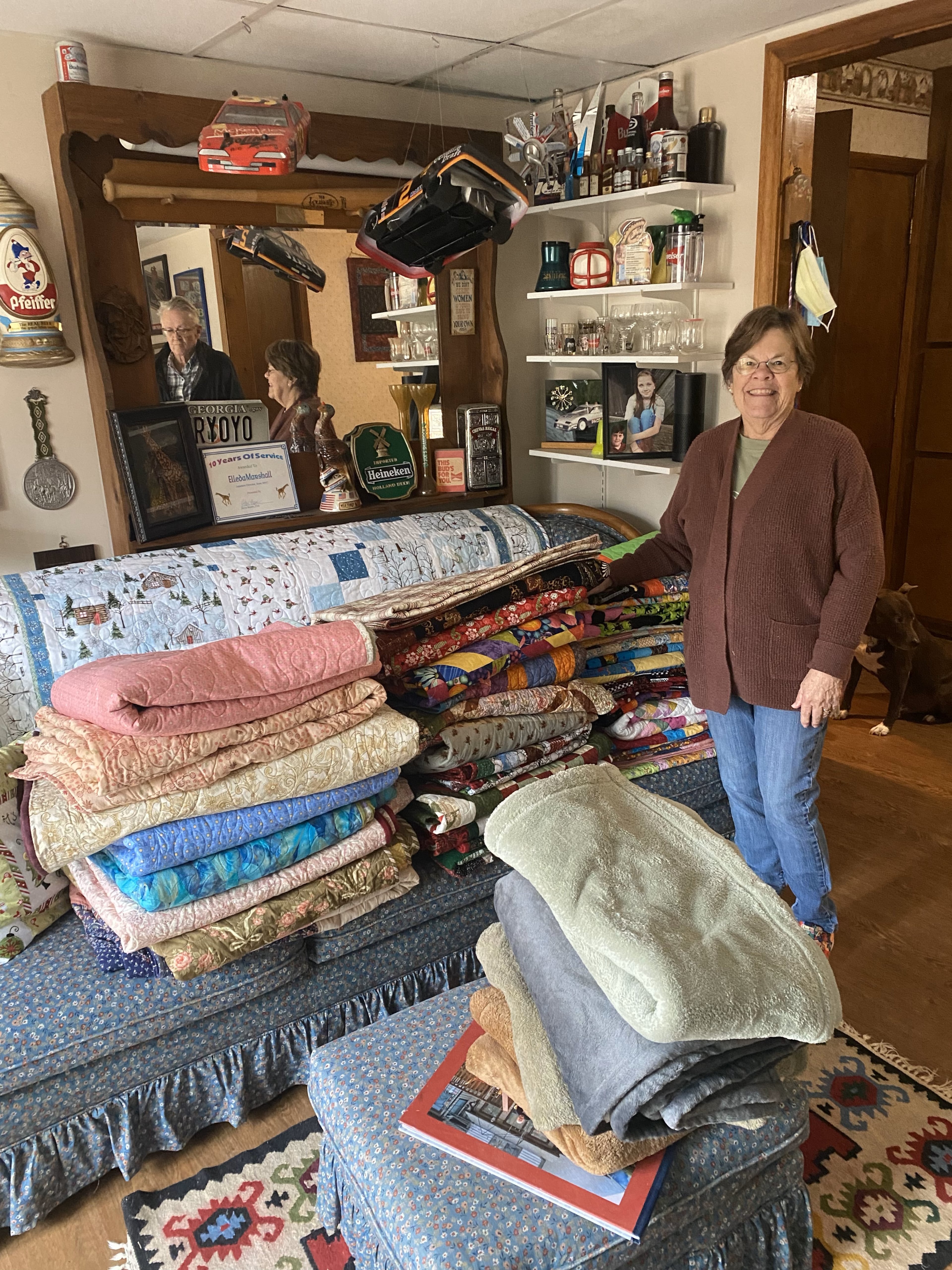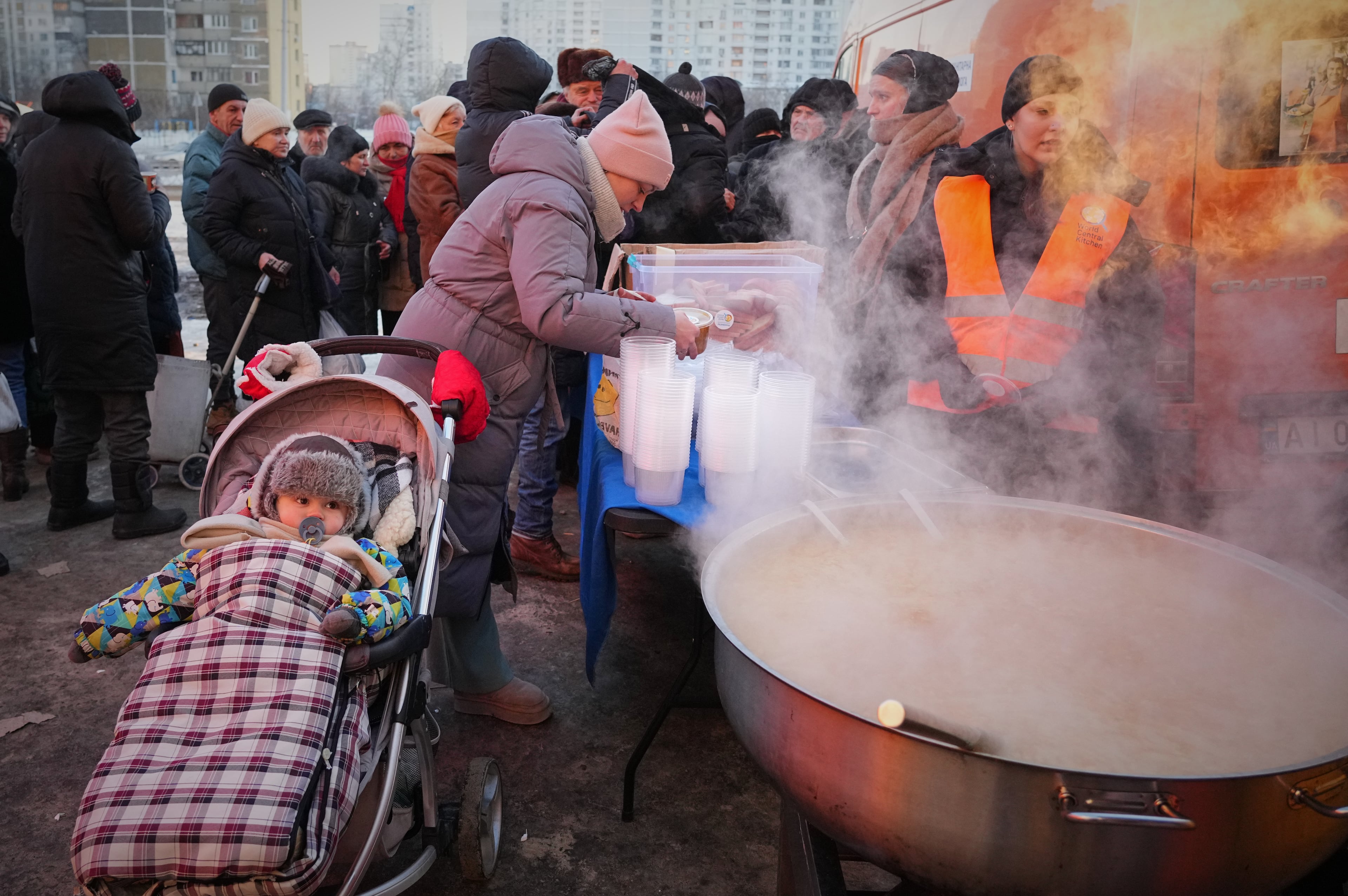Atlanta’s old fashioned sewing circle, Nesty, does international aid

Don’t be fooled by the quilting ladies of Nesty.
Their acronymic name (it stands for Not Even Started Yet) gives the impression of a languid work ethic. They regularly talk about their patchwork art with terms such as PHD (Project Half Done) or UFO (Unfinished Object).
But these women are finishers. Recently they were asked to contribute to a nonprofit to help Ukraine.
Atlanta-based HelpingUkraine.us has provided food, fuel, wood-burning stoves, generators, $4 million in medical supplies, financial support, even ambulances to the war-ravaged country. Ukrainians have suffered through two freezing winters of bombed-out power plants and fuel shortages. Nesty was asked for blankets.
“We don’t make blankets,” said Nesty member Becky Windle, of the Berkeley Lake community. “We make quilts.”
So Nesty got to work and built 40 hand-made quilts.

During a recent ceremony at the Millennium Gate Museum, they gave the quilts to Marina and Denis Serdichenko. Marina is a chaplain and Denis is senior pastor at the Odesa People’s Church, in Odesa, Ukraine. Both work to help refugees and orphaned and traumatized children.
The Serdichenkos reaction to the gift was gratifying for the Nesty members.
“I’m an artist,” said Denis, “and these are art. Through these the people feel love. If people just have this in their room they see and know that people love them.”
Marina acknowledged that a machine-made fleece blanket could keep a child just as warm as a handmade quilt. The difference she said is the thought and care that goes into those stitched-together collages of delight.
Said Marina, “To have this piece of love in your room means a lot. It means we’re not alone.”
The group celebrated the gift exchange with traditional Ukrainian party food, including crepes, honey-cakes and a fruit drink made of black currants called “compot.”
Ukrainian-American Olga Gorman, program director for HelpingUkraine.us, was also at the ceremony, wearing a 100-year-old linen shirt embroidered with colorful characters, handmade in the Carpathian Mountains.
She looked with admiration at the brilliant colors and the geometric shapes of the textile mosaics. “It reminds me of my grandmom, she used to do the same,” said Gorman. “It was a piece of love you could go to bed with.”
“For us, that was fun,” said Windle later. “It was above and beyond what we were expecting.”
Nesty had its beginnings in a Duluth quilt shop called Share the Spirit where many of the members first met. The owner, Diane Berdis, invited customers to open houses on Friday nights, where they would assemble squares late into the evening.
When the shop closed in 2007, the women decided to continue gathering at each other’s houses. “We didn’t want that camaraderie to go away,” said Nesty member Melanie Bellavich, of Suwanee.
These days they meet once a month on Saturdays, and take turns hosting. The get-togethers begin in the morning and last through lunch and supper. Membership is limited to 15 women, plus a waiting list. At least two members drive from out of state.
Each brings a portable sewing machine and they set them up on dining room tables, TV trays, folding tables, end tables, every horizontal surface. And they all sew at once.
The sound of the clattering machines is enormous, but conversation continues. “We shout,” said member Elleda Rule, of Duluth. There is one important rule she added: “We don’t talk politics.”
These social occasions are a bit like the quilting bees of the 19th century, with the difference that the Nesty members are rarely collaborating on a single quilt. Generally each works on her own UFO.
And despite the ruckus of 15 sewing machines chugging at once, the experience is a tranquil, high-touch moment in a digital low-touch world. “It’s soothing for us and peaceful for us,” said Windle. “It gives me a gratification to look at what I’ve done.”
Some women fashion squares from fabric they already have on hand; others find just the right color combinations at quilting shops and fabric stores.
It’s possible to order fabric online, said Windle, “but I like to touch it and feel it, and see the colors and see, is this the right shade of red?”
Rule is retired, like most of the members. She worked for Toys R Us for 20 years, and then in a quilting shop. People have suggested that she could sell her quilts, but she demurs. She said it’s hardly practical to price her quilts or calculate the time and effort that go into making them, because no one would want to meet that price.
“We don’t sit down and figure out how much the labor is, because if we did then we probably wouldn’t quilt and probably we’d just be old ladies looking at TV and drooling.”
Better to give them to a friend. Or a relative. Or a cold child sleeping somewhere in Odesa.



